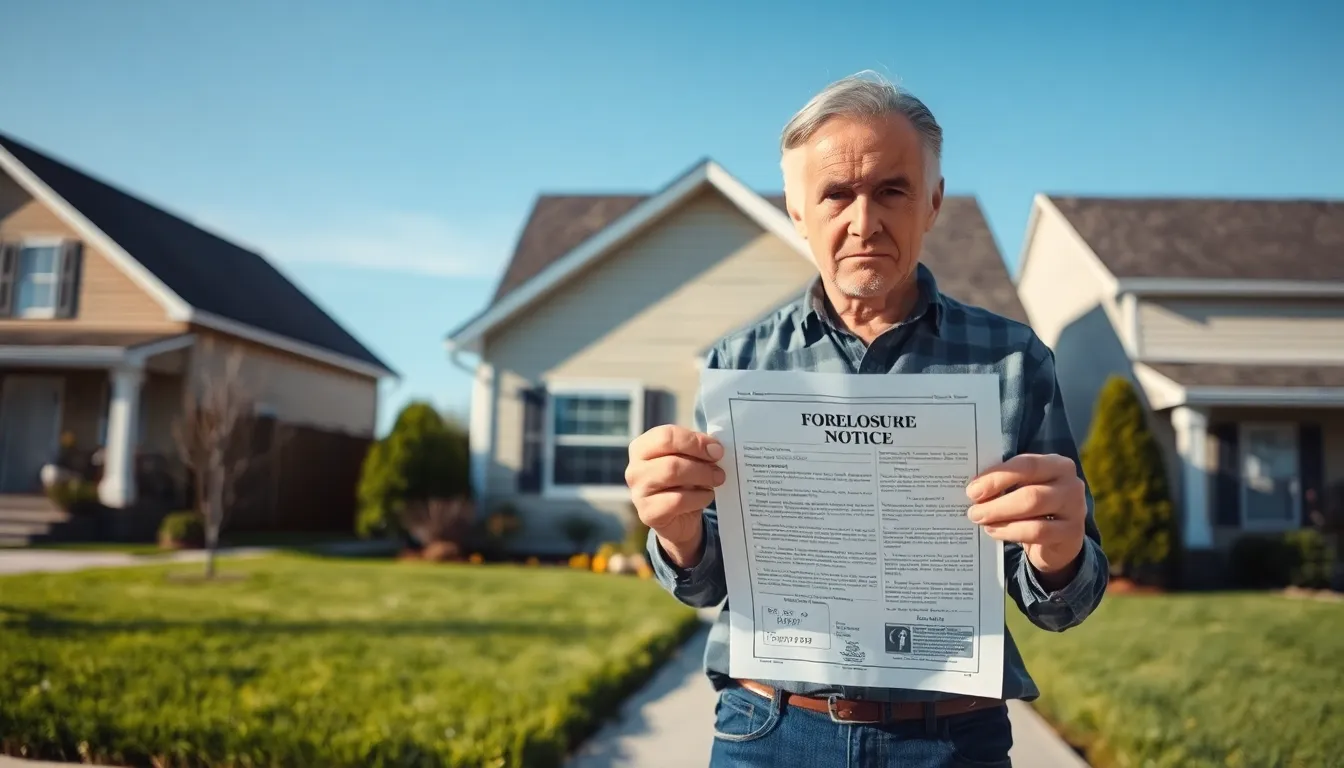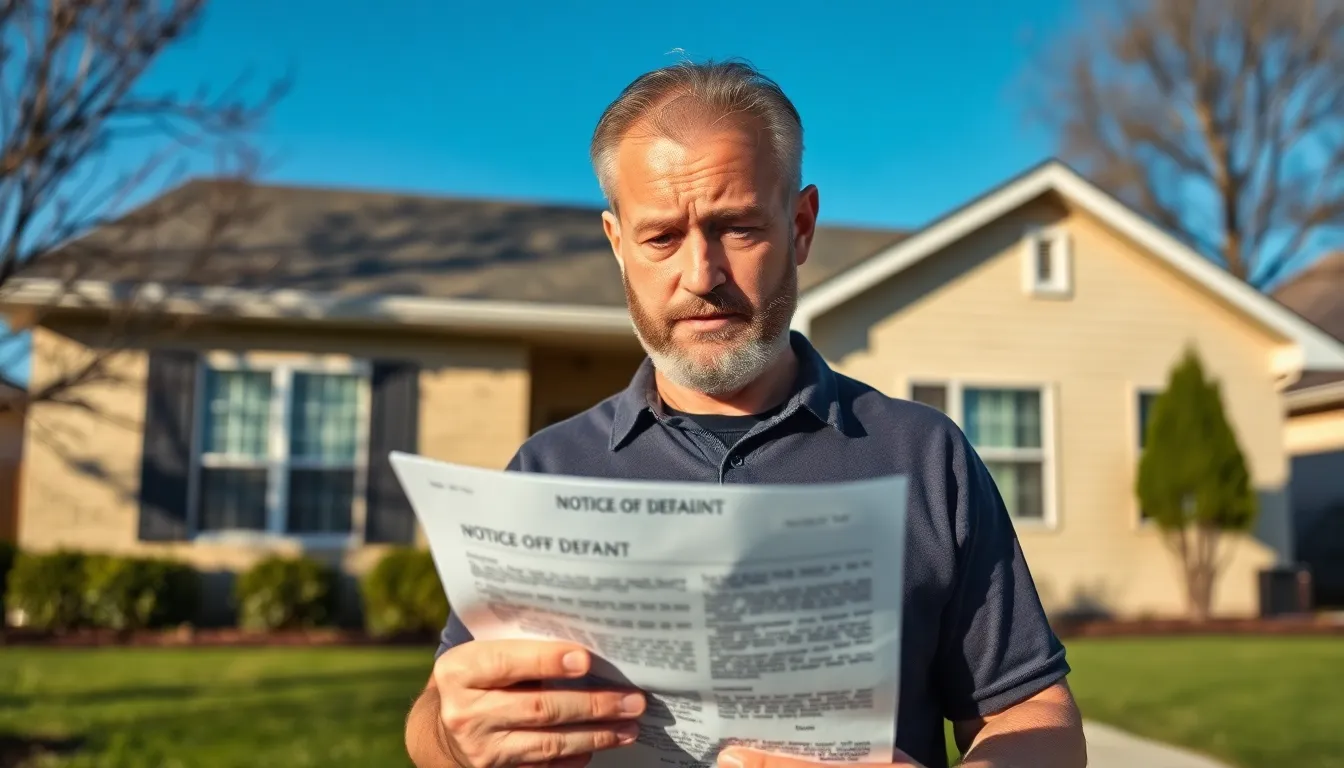Table of Contents
ToggleNavigating the foreclosure process can feel like trying to solve a Rubik’s Cube blindfolded—confusing and a bit daunting. But fear not! Understanding this complex journey can save homeowners from a financial cliff dive. Whether it’s a sudden job loss or unexpected medical bills, life can throw curveballs that lead to foreclosure.
Overview Of Foreclosure Process
The foreclosure process consists of multiple stages designed to address unpaid mortgage loans. Homeowners typically receive a notice of default after falling three to six months behind on mortgage payments. This notice initiates a period, often lasting 90 days, where the homeowner can rectify the delinquency by making necessary payments.
Next, if the homeowner does not respond, the lender may schedule a foreclosure auction. The auction allows the property to be sold to the highest bidder. At this stage, the lender aims to recover as much of the unpaid debt as possible. Properties sold at auction may draw significant interest, as investors look for bargains.
Following the auction, the homeowner may face eviction. This process can further complicate matters as additional legal actions may arise. Depending on the state laws, eviction timelines can vary, with some households having mere days to vacate the property.
Throughout the foreclosure process, homeowners have options such as loan modification, short sale, or deed in lieu of foreclosure. Seeking legal advice or financial counseling can help homeowners navigate these alternatives effectively.
Communicating regularly with the lender adds another layer of strategy. Lenders often prefer to work with borrowers who openly discuss their financial difficulties. Their willingness to negotiate could lead to potential solutions before the process escalates.
Understanding the broader implications of foreclosure, such as its impact on credit scores, equips homeowners with knowledge to make informed decisions. Many homeowners experience significant credit score drops post-foreclosure, which may hinder future housing opportunities.
Stages Of Foreclosure
Understanding the stages of foreclosure is essential for homeowners facing financial distress. Each stage has specific characteristics and implications.
Pre-Foreclosure
Pre-foreclosure begins when homeowners miss three to six mortgage payments. A notice of default is then issued, signaling the start of a 90-day period. During this time, homeowners can rectify their delinquency, negotiate with lenders, or explore options like loan modification. Awareness of rights is crucial, as engaging in communication with the lender may lead to greater flexibility. Homeowners should investigate alternatives to mitigate their situation before it escalates.
Auction Process
If resolution efforts during pre-foreclosure fail, the lender may schedule a foreclosure auction. The auction serves as a public sale of the property, allowing the highest bidder to acquire it. Potential buyers should conduct thorough research and assess property values beforehand. Homeowners may face the overwhelming reality of having to vacate, and state laws will dictate the timeline and procedures involved. Bidders at these auctions usually include real estate investors and individuals seeking deals.
Post-Foreclosure
Post-foreclosure occurs once the home sells at auction or reverts to the lender. The lender typically seeks to recover the outstanding debt through the sale of the property. Homeowners faced with eviction may struggle with emotional and financial repercussions. The impact on credit scores can be severe, lasting up to seven years. Seeking legal advice or financial counseling is advisable during this phase to explore options such as rehabilitation or rebuilding credit. Understanding future housing opportunities remains crucial as these experiences shape long-term financial stability.
Legal Aspects Of Foreclosure
Understanding legal aspects of foreclosure is vital for homeowners facing this challenging situation. Various laws and regulations govern the foreclosure process, varying by state and influencing rights and options.
State Laws And Regulations
State laws significantly influence the foreclosure process. Each state has unique foreclosure statutes, dictating procedures, timelines, and rights of parties involved. Judicial and non-judicial foreclosures commonly exist. In judicial foreclosures, court involvement is mandatory, while non-judicial foreclosures allow lenders to proceed without court action, streamlining the process. Some states implement foreclosure mediation programs to encourage negotiations. Others provide anti-deficiency laws protecting homeowners from owing remaining debt after foreclosure sale. Familiarity with state-specific laws enables homeowners to navigate their options effectively and make informed decisions.
Rights Of Homeowners
Homeowners retain various rights during foreclosure proceedings. They possess the right to receive clear notifications, including a notice of default and other essential documents. Homeowners can challenge the foreclosure in court if they believe it is unjust or illegal. Seeking loan modification or other alternatives during the pre-foreclosure phase is also within their rights. Additionally, homeowners can communicate and negotiate with lenders to explore loss mitigation options. Knowing these rights empowers homeowners to take proactive steps in protecting their interests and potentially avoiding foreclosure.
Impact Of Foreclosure
Foreclosure significantly affects homeowners in various ways. Understanding these impacts helps individuals navigate their options more effectively.
Financial Consequences
Financial loss often results from foreclosure. Homes typically sell for less than market value at auction, leading to significant deficits. Many homeowners experience a drastic drop in credit scores, often losing 100 points or more. This substantial impact hinders future borrowing abilities and leads to higher interest rates for new loans. Moreover, accessing rental housing becomes complicated, as many landlords perform credit checks. Long-lasting consequences such as these emphasize the importance of exploring alternatives to foreclosure. Seeking legal advice can mitigate financial fallout.
Emotional Effects
The emotional toll of foreclosure is considerable. Many individuals face stress, anxiety, and depression during this tumultuous period. Feelings of shame and guilt frequently emerge, impacting both mental and social well-being. Often, homeowners feel isolated, as friends and family may not understand their situation. The concern for housing stability creates ongoing uncertainty, affecting daily life and decision-making. Support networks play a crucial role in fostering resilience in these challenging times. Prioritizing mental health resources can help in coping with the emotional aftermath of foreclosure.
Alternatives To Foreclosure
Homeowners facing foreclosure have several alternatives to consider, which can help them maintain their financial stability.
Loan Modification
Loan modification serves as a viable option for many homeowners. This process involves negotiating with the lender to change the terms of the mortgage, making payments more manageable. Adjustments can include lowering interest rates, extending the loan term, or even reducing the principal amount. Homeowners typically need to provide documentation of their financial situation, such as income and expenses, to support their request. Successful loan modifications can prevent foreclosure and allow homeowners to stay in their homes, positively impacting their budget and emotional well-being.
Short Sale
Short sales present another alternative to foreclosure. In this scenario, homeowners sell their property for less than the outstanding mortgage balance, requiring lender approval. This approach helps avoid the lengthy foreclosure process and often reduces the negative impact on credit scores. Preparing for a short sale involves working closely with real estate agents familiar with the process and ensuring proper communication with the lender. Through this method, homeowners can transition to a new living situation while minimizing financial losses.
Conclusion
Navigating the foreclosure process is undeniably challenging but understanding it can empower homeowners to make informed decisions. By exploring alternatives like loan modification or short sales and maintaining open communication with lenders, individuals can often find a path forward. It’s crucial to remember that support systems and legal resources are available to help mitigate the emotional and financial toll of foreclosure. Being proactive and informed can significantly impact one’s ability to recover and rebuild after facing such difficulties. Homeowners should take charge of their situation and seek the best possible outcome for their financial future.









